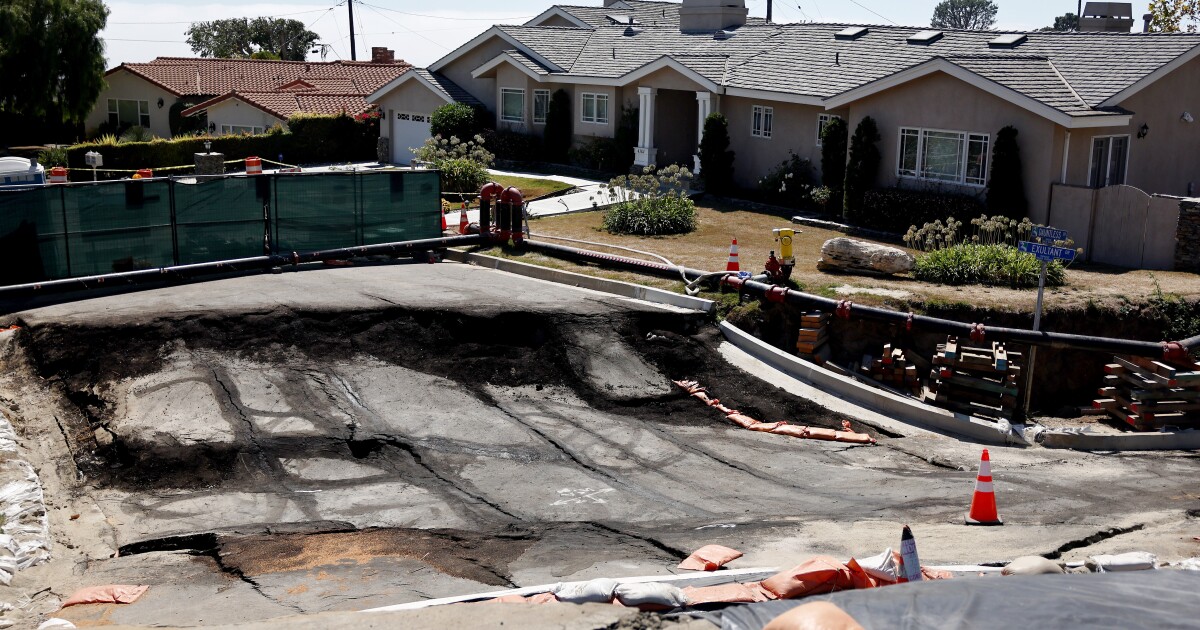Keep up with LAist.
If you’re enjoying this article, you’ll love our daily newsletter, The LA Report. Each weekday, catch up on the 5 most pressing stories to start your morning in 3 minutes or less.
It’s been one year since the land movement in Rancho Palos Verdes knocked out internet service for dozens of residents in the Portuguese Bend neighborhood. According to city officials, about 146 customers have been left to navigate a “digital desert” with few or no options for internet service.
Cox Communications was the main service provider for the neighborhood until last September, Gov. Gavin Newsom declared a state of emergency. That’s when the utility pulled the plug on its services with no clear plans to reconnect customers.
Charla Batey, a public relations manager at Cox Communications, said excessive land movement has caused unsafe conditions for infrastructure and employees.
“We maintained connectivity as long as it was safe to do so, but evolving conditions required us to discontinue service,” Batey said in a statement.
But that withdrawal from Cox Communications has created a digital desert, according to Mayor David Bradley.
“It’s a digital crisis, certainly for remote work, remote learning, having our students be able to have access to their schoolwork,” Bradley told LAist. “So getting them back online, getting them back powered up, and getting them back energized with gas services has been a major endeavor for the city.”
How residents are coping
RPV resident Gordon Leon, who lives in the Portuguese Bend area, said cell phone service is terrible, and many neighbors rely on Wi-Fi to make phone calls.
“What we did is we went right away down to Best Buy and bought a Starlink … because that was really the only economical thing available,” Leon said of the satellite-based internet service.
Mike Agahee of the Portuguese Bend neighborhood told LAist that he and his wife relied on the local library and cafes for their Wi-Fi needs before also investing in Starlink.
“Internet is just as important as having power, or any other utilities, water, gas. It’s a basic need,” Agahee said. “Both my wife and I work remote. That means we are on the phone, on the email and accept team calls.”
Concerns over emergency services
A major cause for concern is the inability for residents to reach emergency services. Some residents have resorted to using radios for communication, according to Bradley.
“Certainly our elderly residents, who rely on that for health care and for health services, that’s been a critical need that’s been really difficult to work through,” Bradley said, adding that analog forms of communication have been most reliable.
Leon said he shares the same concerns, especially since the internet is how many residents connect to services, and that many would have to leave their homes in order to do so. He pointed out that residents rely on their internet to make those Wi-Fi calls or FaceTime audio because the cell service is also bad in the area.
“You could not get a cell phone call unless you drive down the hill and go to an area that has cell coverage,” Leon said.
Latest state of the landslide
At the height of the landslide, Bradley said the region was seeing movement of about 13 inches a week in some places. Now, that has gone down to 10 inches.
“Historically, that has been closer to 10 inches a year, so you can see that we’ve made great progress, but there’s still a long ways to go,” Bradley said.
Meanwhile, the community is finding its way to stay connected, Agahee added.
“It’s all because of volunteers and people in the neighborhood pitching in and helping each other out, especially for the elderly,” Agahee said.
